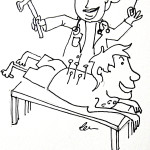In most service industries, there are certain guarantees. If you go to a restaurant, your soup is guaranteed. At the GAP, you will get a pair of chinos, guaranteed. In lots of instances, you get what you are paying for and in most cases, you get to see if before you hand over your credit card—a coffee, a massage. In many cases, if you’re not satisfied, you can get your money back—guaranteed.
This is not the case in medicine. We cannot legally guarantee results. There are no guarantees.
Everybody and every body is different. Contrary to what it might seem like in our age of paralyzing fear of uncertainty, no one has all, or even most, of the answers.
Dr. Google makes it seem like we do, though.
When I see a new patient who is worried about their health and their future, I want to be able to promise them. I want nothing more than to say, “these breathing exercises will eliminate your anxiety, just like you asked for: poof! gone.”
I want to guarantee things.
I want to tell someone that, if they follow my instructions, they’ll never have another hypertensive emergency again. I want to, but I can’t. No one can. And our job is not to guarantee. It is to serve.
A $10,000 bag of chemotherapy pumped into your arm will not guarantee that the cancer goes into remission no matter how many studies show it has an effect. I can’t promise you’ll get pregnant, even though I’m doing my best, you’re doing your best and science is doing its best.
That’s all I can guarantee: that I will try my very best.
I can be your researcher, teasing out the useful scientific information from a sea of garbage and false promises—false guarantees from those who have no business guaranteeing anything. I can provide my knowledge, culminated from years of study and practice and life. I can sit with you while you cry and hear you share your story. I can let you go through your bag of supplements, bought in a whirlwind of desperation, and tell you what is actually happening in your body—something that doctor didn’t have time to explain. I have time to spend with you. We can have a real conversation about health. I can also make recommendations based on my clinical experience, research and millenia of healing practices. These recommendations will certainly help—virtually everyone sees some kind of benefit—but I can’t guarantee that either.
I watched a webinar on probiotics recently. The webinar sent me into a spiral of existential probiotic nothingness. I’ve been prescribing probiotics for years. I’ve seen benefits from them with my own eyes. Patients have reported great things after taking them and I feel better when I take them: my stomach gets flatter, things feel smoother, my mood gets lighter. Probiotics are wonderful. However, according to the research that was being presented by this professional, which he’d meticulously collected and organized, many things we thought about probiotics aren’t true. I’d have to change my whole approach when it came to probiotics, prescribing certain strains for certain conditions where they’d seen benefit. I remember feeling hard-done by by the supplement companies and the education I’d gotten at my school. How could we be so off base on this basic and common prescription?
At the same time, some skeptics were harassing me on Twitter, telling me that I’d wasted 4 years, that naturopathic medicine is useless and doesn’t help people. Besides having helped numerous people and having been healed myself, their words got to me. What if everything I know is as off-base as my previous knowledge on probiotics was?
The very next day, I called a patient to follow up with her. She’d kind of fallen off the radar for a while. She was happy to hear from me. I asked her how she was feeling, if she’d like to rebook. “I don’t need to rebook,” She told me, excitedly, “I’m completely better!”
After one appointment.
I was astounded and intrigued. Of course, we expect people to get better, but it takes time to heal, and I rarely go gung-ho on the first appointment, there was still lots left in my treatment plan for her. She’d been experiencing over seven years of digestive pain, debilitating fatigue, life-changing and waist-expanding cravings for sugar. It takes a while to reverse seven years of symptoms. It takes longer than a couple of weeks. But her symptoms were gone. She felt energized, her mood was great and she’d lost a bit of weight already. She no longer had cravings.
And she’d just started on one remedy.
Which was, you guess it, probiotics.
Sure, you might think. Maybe it wasn’t the probiotics, maybe she would have just gotten better on her own. Possible, but unlikely. She’d been suffering for years.
Ok, then, you say, maybe it was a placebo effect. Maybe it wasn’t the actual probiotics. Again, it’s possible. She’d tried other therapies before, which hadn’t worked, however and she “believed” in them just as much as the probiotic. And the probiotic made her better.
The point is this: we don’t know. Science is magical. People are magical. Medicine, which combines science with people, is the most magical of all. There are no guarantees.
The point is that anything can make anyone feel better: a good cry, a $10,000 bag of chemotherapy, journalling for 12 weeks or popping a probiotic. Some things have more research behind them. Some things we’ve studied and so we know some of the mechanisms for why things work. But we still have a lot of why’s and we always will. Everybody and every body is different. No two people or two conditions should receive the exact same protocol or supplement or IV bag or journalling exercise or cry-fest. We have no guarantees what will work or what will make you feel better. Just some research papers, some experience, maybe the odd dash of intuition or interpersonal connection and a firm resolve to want our patients to get better. And that’s a guarantee.






